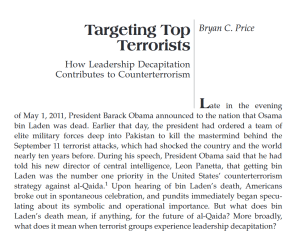
In the spring of 2012, the CTC’s Director LTC Bryan Price had an article of his published in International Security. The article, based on his doctoral research, empirically examines how leadership decapitation contributes to counterterrorism.
Click here to read the article, or peruse the abstract below.
Abstract:
Several states, including Israel and the United States, have put decapitation tactics, which seek to kill or capture leaders of terrorist organizations, at the forefront of their counterterrorism efforts. The vast majority of scholarly work on decapitation suggests, however, that leadership decapitation is ineffective at best and counterproductive at worst. Contrary to this conventional wisdom, leadership decapitation significantly increases the mortality rate of terrorist groups, although the results indicate that the effect of decapitation decreases with the age of the group, even to a point where it may have no effect at all. This finding helps to explain the previously perplexing mixed record of decapitation effectiveness. Terrorist groups are especially susceptible to leadership decapitation because their organizational characteristics (they are violent, clandestine, and values based) amplify the difficulties of leadership succession. Additionally, in contrast to the conventional wisdom regarding the durability of terrorist groups, politically relevant terrorist groups (defined as those with at least four attacks including one attack resulting in a fatality) endure significantly longer than previously believed.
 Skip to content
Skip to content
